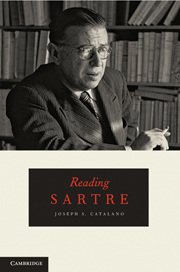Book contents
- Frontmatter
- Contents
- Preface
- Acknowledgments
- Works Frequently Cited
- PART ONE A RETROSPECTIVE OVERVIEW
- 2 Saint Genet: Actor and Martyr
- 3 The Critique of Dialectical Reason
- 4 Being and Nothingness
- PART TWO THE WORKS THEMSELVES
- 5 Being and Nothingness
- 6 The Critique of Dialectical Reason
- 7 Saint Genet: Actor and Martyr
- 8 The Family Idiot
- 9 The Family Idiot
- Afterword: Madame Bovary
- Index
- References
7 - Saint Genet: Actor and Martyr
Published online by Cambridge University Press: 05 June 2012
- Frontmatter
- Contents
- Preface
- Acknowledgments
- Works Frequently Cited
- PART ONE A RETROSPECTIVE OVERVIEW
- 2 Saint Genet: Actor and Martyr
- 3 The Critique of Dialectical Reason
- 4 Being and Nothingness
- PART TWO THE WORKS THEMSELVES
- 5 Being and Nothingness
- 6 The Critique of Dialectical Reason
- 7 Saint Genet: Actor and Martyr
- 8 The Family Idiot
- 9 The Family Idiot
- Afterword: Madame Bovary
- Index
- References
Summary
The chronological order of the French editions of the four major works we are examining – all published by Gallimard – places them about ten years apart: the work on ontology in 1943, the study of Genet in 1952, the Critique in 1960, and the long – even for Sartre – work on Flaubert between 1971 and 1972. If I were adhering to this ordering, I should have thus examined Sartre's work on Genet after his work on ontology and before Sartre's study of history, but, to repeat, I thought it appropriate to consider the two philosophical biographies close together.
What was Sartre writing in the years intervening these four major works? Taking as our guide Michel Rybalka's “selected” bibliography and keeping to the French editions, we can note seven works published prior to Being and Nothingness, eighteen prior to Genet, only four prior to the Critique 1, and, finally, seven prior to The Family Idiot. Together with the four we are studying, we have forty published works of philosophy and literature in a little more than thirty-five years – 1936–1972 – and several more essays followed until Sartre became almost completely blind and stopped writing a few years before his death in 1980. On the other hand, the posthumously published works make it evident that Sartre was writing continuously: We have already mentioned the second volume of the Critique as well as the Notebooks for an Ethics, and we could add The Freud Scenario published in French 1984 and in English in 1986.
- Type
- Chapter
- Information
- Reading Sartre , pp. 137 - 161Publisher: Cambridge University PressPrint publication year: 2010



